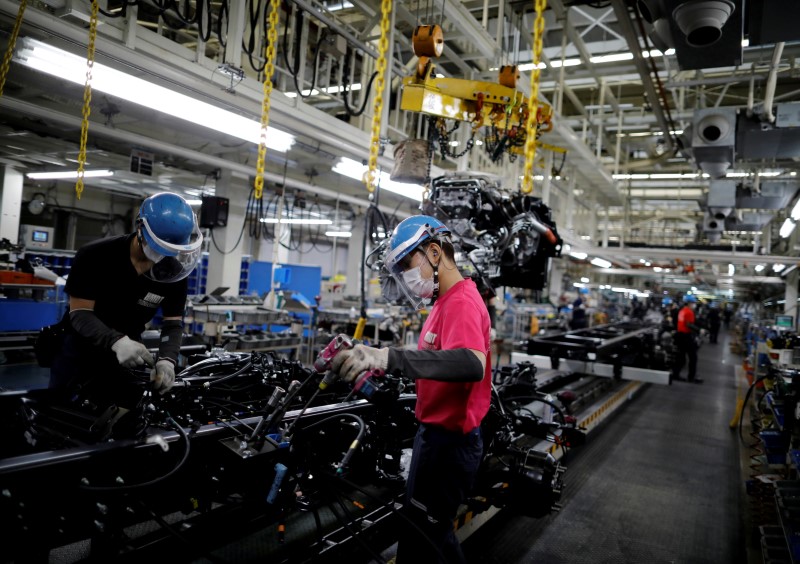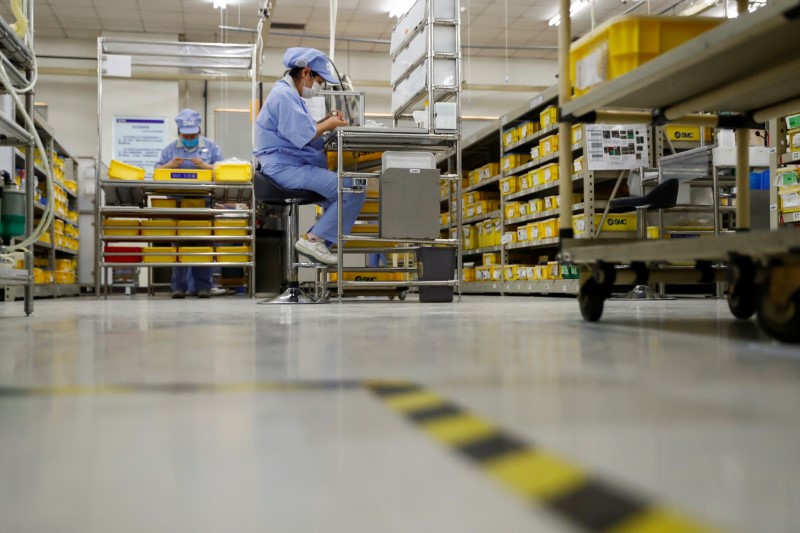By Leika Kihara
TOKYO (Reuters) - Asia's factory pain deepened in May as the slump in global trade caused by the coronavirus pandemic worsened, with export powerhouses Japan and South Korea suffering the sharpest declines in business activity in more than a decade.
A series of manufacturing surveys released on Monday suggest any rebound in businesses will be some time off, even though China's factory activity unexpectedly returned to growth in May.
China's Caixin/Markit Manufacturing Purchasing Managers' Index (PMI) hit 50.7 last month, marking the highest reading since January as easing of lockdowns allowed companies to get back to work and clear outstanding orders.
But with many of China's trading partners still restricted, its new export orders remained in contraction, the private business survey showed on Monday. China's official PMI survey on Sunday showed the recovery in the world's second-largest economy intact but fragile.
Japan's factory activity shrank at the fastest pace since 2009 in May, a separate private sector survey showed while South Korea also saw manufacturing slump at the sharpest pace in more than a decade.
Capital Economics said the region's manufacturing sector is in deep recession.
"Industry is likely to have seen an initial jump from the easing of lockdown restrictions. And things are likely to continue improving very gradually over the coming months as external demand recovers," Capital Economics wrote. "But output is still likely to be well below normal levels for many months to come as domestic and global demand remain very depressed."
Taiwan's manufacturing activity also fell in May. Vietnam, Malaysia and the Philippines saw PMIs rebound from April, though the indices all remained below the 50-mark threshold that separates contraction from expansion.
Official data on Monday showed South Korea extending its exports plunge for a third straight month.
Asia's economic woes are likely to be echoed in other parts of the world including Europe, where economies continue to suffer huge damage in factory and service sectors.
With many countries starting to ease lockdown restrictions imposed to stop the spread of the virus, which has infected over 5.5 million people globally, equity markets are rallying on hopes for a swift return to health and prosperity.
But the trough in global economic activity will be deeper and the rebound is likely to take longer than previously predicted as the pandemic spreads in waves.
The International Monetary Fund warned last month the global economy will take much longer than expected to recover fully from the virus shock, suggesting a downgrade to its current projection for a 3% contraction this year.
A U.S.-China spat over Hong Kong's status and Beijing's handling of the pandemic could sour business sentiment and add to already huge strains on the global economy.
The final au Jibun Bank Japan Manufacturing Purchasing Managers' Index (PMI) fell to a seasonally adjusted 38.4 from 41.9 in April, its lowest since March 2009.

South Korea's IHS Markit purchasing managers' index (PMI) edged down to 41.3 in May, the lowest since January 2009 and below 41.6 in April.
